| BACKGROUND
SCREENING NEWS |
2013
Baker's Dozen Customer Satisfaction Ratings: Pre-employment
Screening
HRO Today's
Baker's Dozen rankings are based solely on feedback from buyers
of the rated services; the ratings are not based on the opinion
of the HRO Today staff. HRO Today collect feedback annually
through an online survey, which is distribute both directly
to buyers through their own mailing lists and indirectly by
sending service providers the link to send to their clients.
Once collected,
response data are loaded into the HRO Today database for analysis
to score each provider that has a statistically significant
sample. For this survey, we required 13 responses from 10 companies,
and we received feedback from more than 600 verified customers.
In order
to determine an overall ranking, HRO Today analyzed results
across three subcategories: service breadth, deal sizes, and
quality.
See
Baker's Dozen Rankings

Under
the Microscope: The How and Why of Background Checks
Corporations are increasingly cautious in order to ensure the
integrity of their service partners are deeper levels and wary
of putting someone in a transferee's path who has not been background-checked.
Many background checks include verification of identity, employment
history, and education; information on credit or financial and
motor vehicle records; confirmation of professional licenses;
and a search to determine if there is a criminal past. The trend
toward background checks being requested more frequently by
those generating transfers and global assignments is driven
by a few factors: the greater overall focus on safety and security
(both data and physical); prodigious advances in technology,
as well as social media profiles that make the screening process
easier; and speedier and more cost-effective channels to source
information. And adding to the argument on behalf of background
checks is the heightened employer concern that individuals may
not always be straightforward about their background and employment
histories. . "Background checks protect the company providing
a service or generation an assignment and also show employees,
their families, and our referral sources that we value their
safety and security," said Lisa Milovanovic, president of Global
Mobility Designs, LLC. Experts agree it is critical to have
a trusted and extremely reputable global vendor network.
Read
more

Screening
2.0
Hiring
employees requires extensive background checks as part of the
employment process. Today's most successful background checks
integrate an applicant tracking system (ATS) with their provider's
background screening technology. Some providers even have mobile
features. Organizations mitigate risk through background screening
to avoid hiring an employee with a criminal past or a range
of fictitious accomplishments. And it's warranted. According
to the ADP Annual Screening Index, 41% of employment, education
and/or credential reference checks revealed a difference of
information between what the applicant provided and what the
source reported. Hiring the wrong employee is dangerous and
expensive. According to the U.S. Small Business Administration,
for every dollar an employer invests in employment screening,
the return on this investment ranges between $5 and $16, resulting
from improved productivity, reduced absenteeism, lower turnover,
and decreased employer liability. At the same time, it is equally
important that the job candidate not feel like he or she is
being unfairly judged or singled out because of an overly burdensome
screening process. Employment branding is also playing a larger
role in the talent acquisition process, and swift and painless
background screening can have a positive impact. A hiring experience
that is error-prone, overly intrusive, or suggests the employer
is technologically unsophisticated will likely steer top-notch
talent elsewhere.
Read
more

Texas Wants Background Checks for Health-care Navigators
The counselors
tasked with helping uninsured Texans navigate their way through
the complicated process of buying health insurance will have
to jump through a series of hoops to get licenses under new
rules proposed by the Texas Department of Insurance. The so-called
navigators would have to prove their citizenship or employment
eligibility, undergo a background check and show evidence of
financial responsibility under the new rules, proposed by Texas
Insurance Commissioner Julia Rathgeber. They would also have
to receive 40 hours of education on Texas-specific Medicaid
and privacy standards, then show proof that they have the proper
training to guide consumers to the right health plans. Navigators
would be prohibited from charging for their services and from
recommending specific health benefit plans to consumers. The
proposed rules would also restrict navigators from providing
advice on the substantive benefits or comparative benefits of
different health plans. "In Texas, we are being vigilant about
safeguarding privacy and keeping personal information out of
the wrong hands," said Rathgeber. "These proposed rules address
insufficiencies in federal regulations and make the training
and qualifications of navigators in our state more readily apparent
to consumers and service providers." Supporters of the Affordable
Care Act said the rules, among the most restrictive in the country
for navigators, will increase costs and could hinder consumers.
Read more



| BACKGROUND
SCREENING NEWS - continued |
Study:
Employers May Be Using Social Media to Discriminate
According
to a new study from Carnegie Mellon University, employers may
be using their social media research of potential applicants
to discriminate. Using fake profiles on popular social networking
sites, the researchers found that Muslim applicants were less
likely to be called back for an interview than applicants with
a profile suggesting they were Christian. The findings demonstrate
the dangers for employers of consulting sources like Facebook
and the potential for relying upon illegal information like
religion when making a hiring decision. Even seemingly innocuous
information - a quote from a specific religious text, for example
- could lead employers to consider off-limit topics like religion
and open themselves to liability.
Disclosures
about sexuality had no impact on early interest from employers,
the study found.
Read more

Commission
Gives U.S. 13 Ways to Save Safe Harbor
The European
Commission has released its report on EU-U.S. data flows, including
a critique of the widely-criticized Safe Harbor framework, which
makes 13 recommendations to improve the data-transfer mechanism.
The commission says U.S. authorities have until summer of 2014
to implement the recommendations, at which point it will revisit
the review. The recommendations call for self-certified companies
to disclose their privacy policies and any privacy conditions
based on relationships with third-party vendors; improved facilitation
to redress methods, including links on certified companies'
privacy policies to alternative dispute resolution (ADR) providers;
notification to EU authorities when complaints are filed with
the U.S. Federal Trade Commission (FTC), and for the national
security exception-which allows law enforcement access to data-to
be used "only to an extent that is strictly necessary or proportionate."
There is also a call for self-certified companies to include,
within their privacy policies, information on "the extent to
which U.S. law allows public authorities to collect and process
data transferred under the Safe Harbor." Dutch MEP Sophie in'
t Veld, vice president of Parliament's Civil Liberties and Home
Affairs Committee, said she's glad the commission is taking
steps, but, "We've been calling for an evaluation or even suspension
action for many years, so this report is overdue." She said
the report is a signal that things are starting to shift.
Read more

How Can Youth Service Providers Keep Sex Offenders Out?
Most all youth-serving organizations rely upon criminal
background checks (CBC) to filter out applicants with sex offenses.
According to Michael Johnson, youth protection director of the
Boy Scouts of America, a complete reliance on CBCs, however,
could be a major error. "Bottom line? You should do them," he
said, "but the expectation -- and that is, the be-all, end-all
-- is a big, humongous mistake." Johnson said criminal background
checks themselves may be one of the reasons why some child predators
end up in youth-service positions. Perhaps the largest downside
to relying on CBCs, Johnson said, is that it only filters out
sex offenders who have been arrested and convicted. "The vast
majority of offenders who are actively sexually abusing haven't
been arrested and haven't been convicted, so criminal background
checks are very limited in what that information can provide
you." Various forms of background checks are available, and
online sex offender registries are improving. However, there
are still many challenges facing youth-serving organizations;
among them, he said, were state-by-state variance in sex offender
classifications. Resources provided by organizations like the
National Center for Missing and Exploited Children were likely
the best places for youth service providers to turn to for information
on background checks and standards pertaining to sex offenders.
Other common protective measures include leadership selection,
interviews, reference checks and the monitoring of staffer and
volunteer behavior.
Read
more

Dodie
Murphy, Founder of Background Check Solutions,
the original tenant screening company in the
U.S. Awarded Woman of the Year by The National
Association of Professional Women
The National
Association of Professional Women (NAPW) honors
Dodie Murphy as a 2013/2014 Professional Woman of the Year for
leadership in tenant screening industry with this prestigious
distinction. As the largest, most-recognized organization of
women in the country, spanning virtually every industry and
profession, NAPW is a powerfully vibrant networking community
with nearly 500,000 members and over 400 Local Chapters.
"Dodie
started Background Check Solutions in September of 1982. It
was even before computers had come out. We had to call the local
credit bureau for a credit report," says Ms. Murphy, who admits
things have changed quite a bit since she founded the company.
For more than 30 years, Ms. Murphy has been providing comprehensive
tenant screening services to landlords and real estate agents
around the country.
Read more

Happy
Birthday to the FACTA! The Often Forgotten Law that Imposes
Obligations and Provides Helpful Exceptions for Employer Background
Checks and Workplace Investigations
Employers
who use a third party to conduct a background check on an applicant
or employee for employment purposes must comply with the FCRA.
But what many employers may have forgotten, is that the Fair
and Accurate Credit Transactions Act (FACTA) also imposes upon
them some obligations when conducting a background investigation.
The FACTA is a 10-year-old law enacted by Congress to combat
identity theft. The FACTA amended the FCRA by fixing a problem
that required employers who retain a third party to investigate
workplace misconduct to comply with the FCRA's four-step process:
the disclosure, authorization, pre-adverse notice and adverse
notice procedures. Employers who engage a third party to investigate
workplace misconduct no longer have to provide advance notice
to the employees under investigation, obtain their prior consent,
or disclose the contents of the investigator's report prior
to taking adverse action based on the report. However, employers
still have some obligations to employees when they have an outside
person or agency do an investigation under the FACTA. They must
provide some summary information, but they do not have to provide
even this information unless and until they take an adverse
action. Remember, the FACTA is the exception, not the rule.
Given the increase in FCRA class lawsuits, employers that use
background checks for employment purposes must ensure they are
taking proper steps to ensure compliance with the applicable
provisions of the FCRA.
Read more

| Welcome
to the U.S. Legal Challenge Question! |
Sponsored By:


As the background
screening industry continues to get more competitive the firms
that will ultimately succeed will be those that create competitive
advantage through their people by offering continuous learning
opportunities to heightened their knowledge and capabilities.
We believe that having employees that are very knowledgeable about
the legal landscape of background screening is essential to continued
success.
We are grateful
to Larry D. Henry who began his law career with the Army JAGC
where he tried over 2,000 cases. After the Army he relocated to
Tulsa. In 1981, the founder of DAC Services contacted Mr. Henry's
firm for assistance in creating a background screening company.
Since Mr. Henry's practice was employment law, the firm believed
this fell within his area and as they say: "the rest is history".
His practice has kept him in continual contact with the background
screening industry, and he is a nationally recognized expert in
the area of background screening.
Mr. Henry's
practice is concentrated on employment law and in specific, background
screening of employees. He represents consumer reporting agencies
throughout the United States and two national trade associations.
He is the author of the Criminal Records Manual and the on line
reference site:CRAHelpDesk.com, and he is a frequent presenter
across the country on various topics dealing with background screening.
Please choose
your answer by clicking on it:

Lawsuit
Raises FCRA Fears
A class-action
lawsuit against Disney serves as a stark reminder that employers
better follow the letter of the Fair Credit Reporting Act when
it comes to notifying job candidates or employees about adverse
actions against them due to something that showed up in a background-screening
report.
With an increasing
number of employers facing lawsuits under the Fair Credit Reporting
Act based on actions taken -- or not taken -- during their recruiting
and hiring procedures, experts and employment attorneys are cautioning
them to know the letter of this law before deciding on any job
candidate.
More importantly,
if they're going to decide not to hire someone because of what
turned up in a background check, they'd better cross their t's
and dot their i's when it comes to notifying the applicant about
the decision that's about to be made.
The latest
to be pulled into the fray, Disney, is accused of knowingly violating
the FCRA by failing to provide job applicants and employees with
adverse-action notices and copies of background reports prior
to negative decisions being made.
In the class-action
lawsuit, Culberson v. The Walt Disney Company, Robert
L. Culberson claims Disney illegally barred him from employment
by failing to provide him with the notice -- required by the FCRA
when an adverse-employment decision is based on any portion of
a background check.
Read
more

State
"Ban the Box" Legislation Gains Momentum
The "ban
the box" movement continues to sweep through state legislatures.
Recent legislation in two states applies "ban the box" prohibitions
to private employers in the state.
On December
1, a new North Carolina law went into effect that prohibits employers
from inquiring about arrests, charges or convictions that have
been expunged. This prohibition applies to requests for information
on applications and during interviews with applicants. In addition,
applicants are not required to disclose expunged arrests, charges
or convictions. .
On January 1, 2014, a new Minnesota law goes into effect that
prohibits employers from inquiring into, requiring disclosure
of or considering the criminal record or history of an applicant
until the applicant has been selected for an interview or, if
there is no interview, until after a conditional offer of employment
has been made.
Read more

Federal Motor Carrier Safety Administration (FMCSA) To Change
Violation Challenge Process In PSP, CSA
The way Federal
Motor Carrier Safety Administration (FMCSA) reports driver violations
to the mega database that feeds data to the Pre-Employment Screening
Program and Comprehensive, Safety, Accountability enforcement
program is changing. The FMCSA published a notice on Dec. 2nd
that outlines the way violations will be reported to the Motor
Carrier Management Information System (MCMIS).
That database supplies the roadside inspection and violation data
to the PSP and the CSA program. The PSP program provides listings
of all driver roadside inspection violations and crash reports
to prospective employers. CSA scores and weights violations to
determine motor carrier and driver compliance in various categories.
The motor carrier rankings are public, but the driver ratings
are used internally at FMCSA for enforcement only.
With the announced changes, challenged violations that have a
corresponding citation that is either dismissed or given a "not
guilty" verdict will have the challenged violation removed. Citations
that are dismissed by a court but have fines or court fees assessed
will be reported as convictions to the system.
Read
more



Legislation
Introduced to Prohibit Employers From Requiring Credit Report
Disclosure
U.S. Senator
Elizabeth Warren (D-Mass.) introduced the Equal Employment for
All Act with several other Senators. The legislation would prohibit
employers from requiring potential employees to disclose their
credit history as part of the job application process. It was
previously thought that credit history may provide insight into
an individual's character, but research has shown that an individual's
credit rating has little to no correlation with his or her ability
to be successful in the workplace. "A bad credit rating is far
more often the result of unexpected medical costs, unemployment,
economic downturns, or other bad breaks than it is a reflection
on an individual's character or abilities," Senator Warren said.
"Families have not fully recovered from the 2008 financial crisis,
and too many Americans are still searching for jobs. This is about
basic fairness -- let people compete on the merits, not on whether
they already have enough money to pay all their bills."
A study from
the Federal Trade Commission earlier this year suggested that
errors in credit reports are common and, in many cases, have been
difficult to correct. "It makes no sense to make it harder for
people to get jobs because of a system of credit reporting that
has no correlation with job performance and that can be riddled
with inaccuracies," Warren said.
Senator Warren's
bill is based on H.R. 645, which was introduced by Congressman
Steve Cohen (TN-9) in 2011.
Read
more
Text of the Legislation
is Available Here Fact Sheet is Available
Here

Drugs
in Workplace Understated Crisis
When former
drug czar and retired U.S. Army Gen. Barry R. McCaffrey promoted
drug-free-workplace programs, employers often said they supported
giving job applicants drug tests because this practice slashed
recruiting, training, health care utilization and turnover costs,
since chronic alcoholics and drug addicts simply did not apply.
When McCaffrey told management to stay out of the room and asked
employees what they thought, all he heard about was worker safety.
The issue of drugs in the workplace is an understated crisis that
results in $200 billion in lost productivity annually, in large
part because an estimated 20 million Americans need treatment
but don't get it, said McCaffrey, who was the director of the
White House Office of National Drug Control Policy from 1996 to
2001. Substance abuse has big implications for employer productivity,
workplace safety and stability, the economy, crime and turnover.
Emphasizing that help is available, McCaffrey said HR professionals
should play a key role in promoting a drug-free workplace. When
it comes to drugs in the workplace, McCaffrey recommends that
employers: Do pre-employment drug screening, but don't stop there-consider
follow-up tests; Have a well-developed employee assistance program
(EAP); Don't ignore the problem; and Don't fire the person. It
may seem the easiest thing to do, but "you're losing a productive
human being who actually has a disease model that we can deal
with.
Read more

Drug Use Among U.S. Workers Declines 74% Over Past 25
Years, Amphetamine and Opiate Use Grows
Quest Diagnostics' 25th Anniversary Drug Testing Index
reports a deep drop in drug use among American workers in the
quarter century the Index has been published. Based on over 125
urinalysis drug tests, the laboratory network and provider of
diagnostic information said use had plummeted 75% since its data
assessment initiative began shortly after passage of the 1988
federal Drug Free Workplace Act through 2012. Among the more significant
findings announced by Quest: The positivity rate for the combined
U.S. Workforce dropped from 13.6% in 1988 to 3.5% in 2012 (74%);
The positivity rate for the Federally Mandated Safety-Sensitive
Workforce declined by 38% from 2.6% in 1992 to 1.6% in 2012; The
positivity rate for the U.S. General Workforce declined by 60%,
from 10.3% in 1992 to 4.1% in 2012. Despite the overall decline,
the positivity rate for certain drugs such as amphetamines and
prescription opiates rose during this period. A 2012 report by
Quest Diagnostics found that the majority of Americans misused
their prescription medications, including opioids and amphetamine
medications. The data suggests, in our opinion, that workplace
drug testing, with its threat of disclosure and risk of disciplinary
action and termination, has helped reduce markedly the positivity
rates for illegal drugs over the last 25 years, but that employers'
testing programs must be reviewed periodically and revised to
address the abuse of new and different drugs and controlled substances,
and changes in laws and regulations.
Read more

Hair Testing for DOT Drivers Proposed in Congress
Millions
of truck drivers subject to the Department of Transportation's
Federal Motor Carrier Safety Administration drug and alcohol testing
regulations may be subject to hair testing for alleged drugs in
addition to the urine testing currently authorized under the FMCSA
rules, if recently proposed federal legislation is enacted. Relying
on the results obtained by Arkansas-based J.B. Hunt Transport
Services, Inc., which has been using hair testing in its drug
screening procedures for over seven years, Rep. Rick Crawford
(R.-AR.) and Senator Mark Pryor (D.-AR.) and others, introduced
bills in both houses, entitled the 'Drug Free Commercial Driver
Act of 2013" (S. 1625; H.R. 3403) to allow motor carriers to conduct
hair testing for drugs, as an alternative to urine testing, for
certain DOT-required drug tests. J.B. Hunt reported that by using
hair testing for pre-employment drug tests the company had rejected
more than 3,200 prospective drivers between May 2006 and February
2013. Meanwhile, only 90 applicants failed urine tests required
by federal regulations, the company said. J.B. Hunt reportedly
regards hair testing as superior to urine testing for pre-employment
purposes. The bills would permit, but not require, truckers to
use hair tests for pre-employment and random drug testing of drivers,
instead of urine tests. "This is all about trying to create a
safe environment in the industry since it helps identify "chronic
drug users instead of relying on a two or three day snapshot."
Rep. Crawford explained.
Read more

Public
Record Update
Sponsored by:
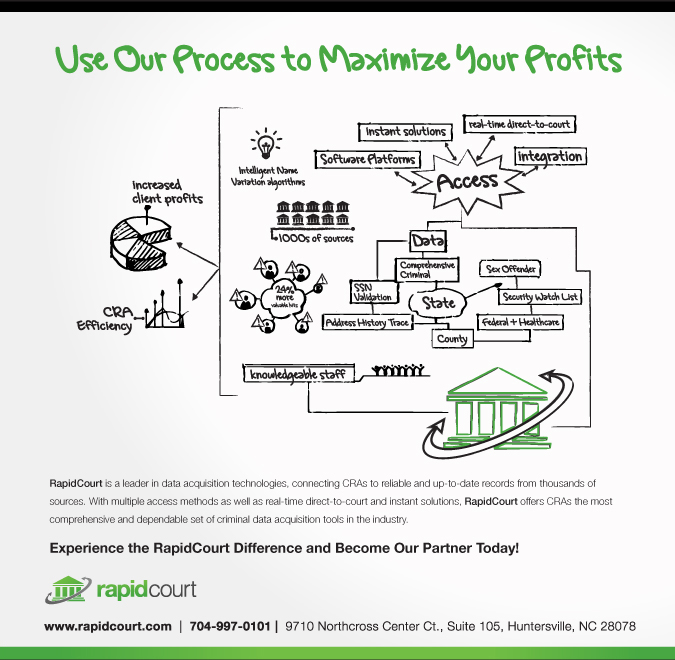
Public
Record Update
By Mike Sankey, PRRN
| MEDIA
RESOURCES FOR INVESTIGATORS |
The following
text appears in the Third Edition of The
Manual to Online Public Records (2013, Facts on Demand Press),
by Michael Sankey and Cynthia Hetherington.
The media
is an often overlooked resource for finding clues to public records
and public record trails. Researching 24-hour news outlets, press
releases, company announcements, trade journals and magazines
is a great way to find many leads. Below are some research sources
and tips that should prove helpful.
News
Journalism
Links to thousands of newspapers, radio and TV stations, magazines,
and foreign outlets are found at two excellent web pages: www.editorandpublisher.com
and www.newslink.org
.
A web page specializing in magazine stories is www.highbeam.com
.
Without a doubt the leading trade association for journalists
is the Investigative Reporters & Editors, Inc.
This organization promotes high standards while providing educational
services to reporters, editors and others interested in investigative
journalism. Visit the IRE web page at www.ire.org
.
CNN provides a web page to obtain transcripts of broadcasts. Visit
http://transcripts.cnn.com/TRANSCRIPTS/
.
Back
Issues in Print
The United States Book Exchange is a non-profit organization which
supplies back issues of scholarly periodicals, trade journals,
popular magazines and other serials to libraries worldwide. Visit
them at www.usbe.com
.
Another good resource for finding locations and stores selling
back issues of a magazine is presented at www.trussel.com/books/magdeal.htm
.
Other
Recommended Free Web Resources
Websites that offer free access to news stories usually allow
searching by either topic or by location. Here are four sites
excellent for investigations.
These sites are organized by topic.
-
NewspaperArchive.com . Use their seven-day free trial to
see if this works for you.
- Google
News (
news.google.com ). Offers current news (within 30 days)
and is an excellent source for local news with approximately
4,500 news sources worldwide.
These sites
are organized by location.
-
NewsLibrary.com enables a search by location and by available
news on a specific topic.
-
ThePaperBoy.com includes national and international locations.
For more
information contact Michael Sankey at mike@brbpublications.com
or visit www.brbpublications.com/updates.aspx

Congratulations
To Platinum Members Named as Top Providers in Pre-Employment Screening
Services Based On Customer Satisfaction Surveys In The HRO Today's
2013 Baker's Dozen
·
Aurico
· Accurate Background
· Employment Background Investigations, Inc. (EBI)
· First Advantage |
·
Global HR Research
· Orange Tree Employment Screening
· Universal Background Screening |

 NationalBackgroundData.com
is now CoreLogic.com/NBD NationalBackgroundData.com
is now CoreLogic.com/NBD
This is just
a reminder that you can now find information about National Background
Data by CoreLogic® at CoreLogic.com/NBD.
Information
is at the core of every smart decision. And CoreLogic delivers
the quality data and insight you need to drive strategy, solutions,
revenue and ultimately success.
To access
NBD on the web go to www.CoreLogic.com/nbd.

Background
Screening Firm PreCheck Gets Certified Green
PreCheck,
a background screening firm focused on serving the healthcare
industry's employment screening and credentialing needs, announced
it has recently earned Gold level green business certification
by the Green Business Bureau (GBB). During its twentieth anniversary
serving the healthcare industry, PreCheck decided to join the
Green Business Bureau in an effort to minimize the company's environmental
impacts. The Green Business Bureau is a national membership organization
that uses an online assessment to certify green businesses.
Bryan Barajas,
Marketing Director, states, "As a company, patient care and healthcare
are central to who we are. While we make a difference each day
by safeguarding healthcare facilities for patients and their families,
we are also committed to protecting our environment." By joining
the Green Business Bureau, PreCheck is contributing to the education
and promotion of green businesses while spreading environmental
consciousness among their customers.
Read more

InfoMart Host Campaign Fundraiser to Benefit Attorney General
Sam Olens
December
17, InfoMart hosted the Georgia background screening community
for a campaign fundraiser to benefit
Attorney General Sam Olens. Recently Olens joined eight other
state attorneys general in sending a statement to
the Equal Employment Opportunity Commission (EEOC) regarding lawsuits
filed by the commission that deal with
employers' use of criminal background checks. The luncheon, co-sponsored
by InfoMart and International Screening Solutions, gave Attorney
General Olens the opportunity to address the concerns of the background
screening
industry in Georgia, and answer questions about the EEOC's April
2012 guidance on use of criminal background
checks for employment purposes. Olens showed his support for employers'
use of a proper screening process,
noting that "background checks are intended to protect employees
and consumers - plain and simple."
Tammy Cohen, InfoMart's President and Chair said, "Attorney General
Olens is a long-time supporter of compliant
background screening companies. InfoMart was proud to host this
event, and to gather other industry experts for
an open conversation about the state of our industry here in Georgia."
In addition to representatives from InfoMart
and International Screening Solutions, attendees included key
leadership from Georgia screening companies such
as Vericon, Lighthouse Information Services, and SJV & Associates.
For more
information about InfoMart and its innovative employee programs,
please visit www.infomart-usa.com

Hiring
Intentions at Record Levels as Candidates become More Selective
America's
professional workforce is set to expand in the New Year with 55
percent of hiring managers and recruiters planning to hire more
professionals in the first half of 2014, than they did in the
second half of 2013. That's up nine percentage points from the
same period a year ago and the highest level on record since the
question was introduced mid-2010 into the national hiring survey
conducted by Dice Holdings, Inc., a leading provider of specialized
websites for professional communities.
By comparison,
six months ago 52 percent of hiring managers and recruiters predicted
an increase in their staff in the second half of 2013, compared
to the first half of the year.
Read more

ManpowerGroup
Survey: U.S. Q1 2014 Hiring Trends Stable
U.S. employers
expect to increase hiring in the first quarter of 2014, according
to the first-quarter 2014 Manpower employment outlook survey released
today by ManpowerGroup Inc. (NYSE: MAN).
Among U.S.
employers surveyed, 17 percent expect to add to their workforces
and 7 percent expect a decline in payrolls during the first quarter
of 2014. Seventy-three percent of employers anticipate making
no change to staff levels and the remaining 3 percent are undecided
about first-quarter hiring plans. This results in a net employment
outlook of 13 percent on a seasonally adjusted basis, the strongest
first-quarter outlook since the first quarter of 2008, when the
employment outlook was 16 percent. This quarter's 13 percent outlook
is the same as the fourth quarter of 2013 and up one percentage
point from last year's first quarter.
U.S. employers
have now conveyed a positive outlook for 17 consecutive quarters.
"Employers
remain optimistic and continue to gradually improve their hiring
projections despite the uneven economic recovery and other global
and domestic influences," said Jonas Prising, ManpowerGroup president.
Read more

App,
App and Away for Background Screening
South Africa's
first mobile app for background screening has been released by
Managed Integrity Evaluation (MIE), Africa's leading background
screening company. The app - dubbed MIE Touch - is available on
Android and Apple smartphones and tablets. A Windows 8 version
is in the pipeline and will be available soon.
The free
app was designed and developed for employers, HR managers and
recruiters who are constantly "on the go" and require real-time
updates regarding background screening requests. The app saves
them the hassle and inconvenience of having to carry a laptop,
go online and download e-mails or login and navigate the Web site.
MIE's CEO,
Ina van der Merwe, says MIE Touch gives users the edge in a highly
competitive industry. "The app is like background screening on
fast forward! Quick answers enable quick decision-making, which
has a wide range of benefits for everyone involved in the recruitment
cycle, including better flexibility, improved service levels,
increased capacity and reduced risk."
Read more

STOP
STRUGGLING WITH WRITING AND PUBLISHING YOUR NEWSLETTER: |

We can help
you have a high quality e-newsletter to help nurture your relationship
with your clients and attract new clients. Our customized newsletter
service will take over your newsletter task or create a new one
for you. We can manage the creation of your newsletter for you.
We are constantly
researching information to use for The Background Buzz and
you can put our research to use for you. Using the information
rich content from The Background Buzz (minus the ads
and competitors information) we will create a custom newsletter
for you.
Use your staff’s
time to do more valuable work and save all the hassle of researching
or writing articles, formatting and managing all the other ezine
tasks with our customized ezine process.
Contact Barry
Nixon at 949-770-5264 or at wbnixon@aol.com
for more information.

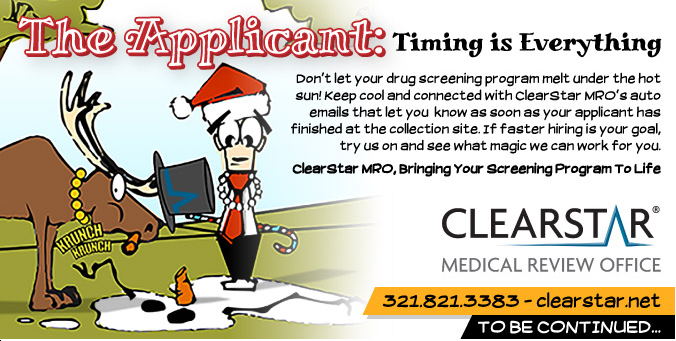

What
Can We Do For You in 2014 To Help You Exceed Your Revenue
Goals? |
Targeted
Marketing Support Services for the Background Screening Industry
PreemploymentDirectory.com
Online background
screening directory featuring background screening firms and suppliers
to the background screening industry. Basic, Gold, Platinum and
Diamond levels of advertising are available. Target audience is
the Human Resources, Talent Acquisition and Recruiting community.
New Opportunities:
Annual Background Screening
Industry Buyers Guide
An annual
print and electronic publication featuring U.S. and international
background screening firms, and timely informative articles. The
Guide is launched annually in June at the SHRM Annual Conference
and distributed to 20,000 plus human resources professionals.
Annual Suppliers to
the Background Screening Industry Buyers Guide
An annual
print and electronic publication featuring suppliers to the background
screening industry. The Suppliers guide is distributed to our
database of more than 1,600 background screening firms and at
relevant professional trade shows.
The Background Buzz
A monthly
e-newsletter distributed to the worldwide background screening
industry that offers comprehensive coverage of information and
news relevant to the screening industry. The e-newsletter is distributed
to more than 1,600 firms in the background screening industry
and accordingly, is an exceptional advertising venue to reach
background screening firms.
The Special International
Edition of The Background Buzz
A supplement
to the regular edition of The Background Buzz that is
published on a bi- monthly basis featuring global information
and news on background screening around the world.
eDirect Mail Campaigns
On demand
e-blast service sent to our database of more than 1,600 firms
in the background screening industry. Each e-blast includes your
advertisement and one relevant article.
Media Releases and Announcements
On demand
releases and announcements to targeted media outlets in the background
screening and recruiting industry.
Private Label Newsletter
Service
Custom designed
e-newsletter service. We create a custom designed e-newsletter
including recommending the name, designing the header, template
and providing the content. Distribution frequency options include
monthly, bi-monthly and quarterly.
See
the Marketing Portfolio that matches your market segment
:
1. U.S. Background Screening
Industry Marketing Portfolio
2. International Background
Screening Industry Marketing Portfolio
3. Suppliers to the Background
Screening Industry Marketing Portfolio

 Kevin Coy is a Partner in the Washington DC office of Arnall
Golden Gregory LLP. Kevin
Kevin Coy is a Partner in the Washington DC office of Arnall
Golden Gregory LLP. Kevin
advises background screening companies and other clients on a
wide range of privacy and consumer regulatory issues, including
Fair Credit Reporting Act, Gramm Leach Bliley Act,
Drivers' Privacy Protection Act, and Dodd Frank Act compliance
issues, as well as data breach matters. Kevin also represents
clients with matters before the Federal Trade Commission, the
Consumer Financial Protection Bureau, and other consumer protection
agencies.
Kevin can
be contacted at Kevin.Coy@agg.com
or 202-677-4034.
THE
WASHINGTON REPORT
December
2013
As Christmas
approached, and with the end of 2013 in sight, "data brokers"-which
the FTC defines broadly to include consumer reporting agencies-once
again found themselves in the spotlight of a congressional hearing
and ongoing FTC scrutiny.
In conjunction
with the hearing, the Majority Staff of the Committee released
a Staff Report: "A Review of the Data Broker Industry: Collection,
Use, and Sale of Consumer Data for Marketing Purposes." The report,
while adopting the FTC's broad definition of data brokers as its
starting point, limited its focus primarily to the use of data
broker information for marketing purposes. Much of the hearing
focused on marketing issues as well, but the hearing was not limited
to marketing issues.
Director
Rich's testimony noted that "FCRA enforcement is a vital priority
for the agency, particularly as companies that are not traditional
credit reporting agencies venture into territory covered by the
FCRA." She also noted that the FTC has brought "almost 100 cases
and obtained in excess of $30 million in civil penalties" for
alleged FCRA violations. Among the cases and actions that she
emphasized were the FTC's enforcement action against Spokeo in
2012 for allegedly selling reports for employment purposes without
complying with FCRA and this year's action against Filiquarian
Publishing LLC for allegedly selling reports for employment purposes
through its mobile application without FCRA protections. As part
of her discussion of the FTC's education efforts, Ms. Rich noted
warning letters that the FTC has issued over the past two years
to data brokers that the FTC believed may be selling reports for
employment or tenant screening purposes without complying with
the FCRA.
The Commission
expects to issue its own long-awaited report on data brokers early
in the new year.
Read
the full report

One
Site! Many Suppliers! |
2013-2014
SUPPLIERS TO THE BACKGROUND SCREENING
INDUSTRY BUYERS GUIDE NOW AVAILABLE!
Looking for the Top Suppliers in the Industry? Need to find a
new Supplier?
Visit our VENDOR SHOWCASE
which features suppliers to the Background Screening Industry.
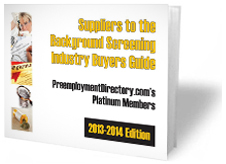
Click
here or on image to get a copy

USCIS
Introduces Social Security Number Locking Feature in E-Verify
USCIS has
announced that the E-Verify System will now be able to incorporate
a security feature where a social security number that appears
to have been misused will now be "locked" in the system, similar
to what credit card companies currently do for clients. The locking
mechanism is triggered by a combination of complex algorithms,
detection reports and other identification patterns built into
the system. "The new enhancements will not catch 100% of all instances
of identity theft," said Josie Gonzalez, Partner at Stone Grzegorek
and Gonzalez, LLP. "No system is perfect. However, the new enhancements
will go a long way to combat identity theft while offering protections
for the victims of identity theft." For workers who have triggered
the lock on the social security number used, they will receive
a tentative non-confirmation (TNC), which will require them to
take affirmative action to resolve the matter by visiting a social
security office and prove their identity before being allowed
to work. On paper, the security enhancement is certainly a positive
step forward to thwarting fraudulent use of documents and preventing
identity theft. Assuming this enhancement in the system works
according to plan, then would-be identity thieves will be ineligible
to work.
Read more

USCIS to Make Changes to E-Verify Memoranda
of Understanding
USCIS has
released new and revised Memoranda (MOUs) for its E-Verify electronic
employment eligibility verification system. USCIS has retitled
and revised its three current MOUs for its general E-Verify browser
users and has also added three new MOUs for (1) employers using
Web Services; (2) employers that use third parties (independent
software developers) to input information into E-Verify using
Web Services; and (3) third parties using Web Services on an employer's
behalf. The E-Verify enrollment process has not changed. New users
to the system will need to review and sign either a new or updated
version of the MOU that applies to their access method. Existing
users will not need to sign a new MOU but will be bound by the
E-Verify changes, including the new or updated MOU, effective
January 8, 2014. In addition, the new and revised MOUs also include
several updated provisions, such as enhanced privacy protections
and instructions for reporting privacy and security breaches.
Lastly, USCIS strongly recommends that existing users of the E-Verify
system review and familiarize themselves with the updated MOU
applicable to their access method. Existing users can log into
E-Verify and visit the "View Essential Resources" section for
the text of the revised MOUs.
Read
more

E-Verify
to Lock Theft-ridden SSNs: We Should All Worry
E-Verify
is being programmed to "lock out" social security numbers (SSNs)
that have been repeatedly used by imposters, generating "tentative
nonconfirmations" (TNCs) for authorized workers assigned to those
SSNs and requiring them to resolve the TNC with potentially understaffed
Social Security offices.
USCIS has
announced that it will lock SSNs that appear to have been misused
based on "a combination of algorithms, detection reports and analysis."
Presumably, USCIS will identify a SSN as "misused" by finding
patterns of use of the SSN by different workers for whom E-Verify
queries have been made by employers. This identification probably
is trickier than it seems, because a worker to whom a SSN belongs
might maintain more than one job at a time with employers whose
E-Verify querying offices are in dispersed locations, and the
worker might change one or more of those jobs frequently. USCIS
might at least initially limit the lockdown to SSNs with blatantly
impossible frequency and geographic breadth of use in E-Verify.
But it appears
that the lockdown is a crude tool that will affect the proper
owner of the SSN as well as the imposters who have stolen it.
The lockdown apparently will cause anyone-- even the worker to
whom the SSN properly is assigned-- to be given a "tentative nonconfirmation"
that must be resolved at an office of the Social Security Administration
(SSA).
While the
goal of deterring SSN fraud is laudable, this approach gives rise
to serious questions, and USCIS' sudden announcement fails to
provide the information necessary for an effective implementation.
Read
more



Grab a latte
and pull of a chair and join us for a great interview with Kiran
Ali, ESQ.,Head of Global Strategy, Corporate Research
and Investigations LLC (CRI Group)

Prior to
joining the CRI Group Kiran was a litigation attorney in New York
City.
 She explained that
Corporate Research and Investigations LLC actually began in 1990
as a local private investigation company and Kiran indicated that
the CRI Group was established in 2001 when the company began being
approached by many organizations to examine occupational fraud
and embezzlement within companies. At that time, most companies
did not have active employee risk mitigation measures in place
to stop fraud or to prevent internal business related crime. Post
September 11, organizations began institutionalizing a system
of risk assessment to determine risk metrics when bringing on
new staff. In this climate, CRI Group went the extra mile to create
a comprehensive employee background screening service department
which in the years since has become a leading and preferred partner
for some of the biggest international companies in the world. She explained that
Corporate Research and Investigations LLC actually began in 1990
as a local private investigation company and Kiran indicated that
the CRI Group was established in 2001 when the company began being
approached by many organizations to examine occupational fraud
and embezzlement within companies. At that time, most companies
did not have active employee risk mitigation measures in place
to stop fraud or to prevent internal business related crime. Post
September 11, organizations began institutionalizing a system
of risk assessment to determine risk metrics when bringing on
new staff. In this climate, CRI Group went the extra mile to create
a comprehensive employee background screening service department
which in the years since has become a leading and preferred partner
for some of the biggest international companies in the world.
She noted
that when you work in the background industry you are directly
affecting the way a company handles its business model. The assistance
you provide is ensuring that a company can proceed with its business
plans without the worry of exposure to the type of risk a dishonest
employee or unethical affiliation would create.
Kiran emphasized
that the CRI Group has always strives to be a resource to its
clientele in the background industry. CRI Group's services span
from pre-employment background searches to corporate due diligence.
She emphasized that their goal is to partner with their clientele
to assist them in guarding themselves against the risks and perils
of doing business in a globalized modern world. She reflected
and noted that the risk faced by companies today are much more
diverse than those faced in yesteryear. In addition, the ethical
and financial risk that plague corporations and businesses are
more profound in a world where everyone is connected.
She stated
with excitement that due to their continuous focus on the needs
of their clientele and the demands of an ever expanding world
economy the company is planning to incorporate fully operational
offices in India and Mainland China. These offices will provide
the company's clients with access to local billing and reports
in the local language of their target companies and individuals.
In addition,
Kiran pointed out that the company has worked hard over the years
to ensure they can give their clientele 'piece of mind' in knowing
who exactly is carrying out their investigations. The CRI Group
is unique among international background screening firms because
they do not outsource any of their work. All over the world, we
employ our own local agents to carry out work on behalf of our
clients.
In responding to my favorite question about looking into
a crystal ball to project what will be happening in the background
screening industry in ten years Kiran believes "The background
industry is likely going to continue to boom." While open source
information is easily accessible in the western world, in the
emerging markets it is hard to access the type of information
required to feel secure in proceeding with your business initiatives.
In a world where international work and immigration is becoming
the norm, services like CRI Groups will be a cornerstone of the
business plans of most responsible companies.
Kiran indicated that part of their business model is ensuring
they are meeting face to face with their clients all over the
world to ensure the company is meeting client's needs and also
to focus on developing personal relationships and trust required
when you are conducting background investigation work for a client.
She referenced many long plane rides and noted that her Kindle
is forever by her side. She is currently reading "The Telling
Room" by Michael Parterniti. It's about a rare Spanish cheese
that carries a legend of secrecy from a Castilian village called
Guzman.
In a very
timely response regarding the person should would really like
to meet she responded she would really like to meet is Nelson
Mandela who changed the face of South Africa by rocking the status
quo. She noted that she finds people that are willing to be revolutionaries
for the causes of their people to be inspiring.
Finally,
in closing she shared with me her favorite quote, "Diligence
is the mother of good fortune, and idleness, its opposite, never
brought a man to the goal of any of his best wishes" ~ Miguel
de Cervantes
To contact
Kiran email her at Kali@crigroup.com.



Criminal Record Checks Available Free to Not-for-profit
Organizations, Starting November 30
Starting
November 30, 2013, British Columbia's government will waive the
$20 criminal record check fee for not-for-profit organizations
that participate in a program that also offers free expert advice.
Under BC law, employers in the volunteer and not-for-profit sector
must obtain criminal record checks for job and volunteer candidates
if they will work with children or vulnerable adults. The province's
criminal record check program aims to alleviate the financial
burden associated with the law. The current fee might seem like
a small amount, but with mandatory checks for multiple job and
volunteer candidates, it can quickly add up. For the program to
continue to pay for itself, the fee for other organizations will
increase to $28. In addition, the program will only waive the
fee for provincial criminal record checks. Employers will continue
to pay for local or RCMP checks. Recent amendments to the Criminal
Records Review Act also create "portable criminal record checks."
Completed criminal record checks will be stored for five years,
during which time a volunteer or job candidate may permit an employer
to access the document. In theory, this will reduce redundant
checks and save employers in the not-for-profit sector money when
they recruit volunteers and employees. Criminal record checks
that indicate a risk cannot be portable.
Read more

Amendments
to China's Consumer Protection Law Add Compliance Obligations
when Handling Personal Information
On October
25, 2013, the Standing Committee of China's National People's
Congress passed anamendment
to the 1993 Law of Protection of Consumer Rights and
Interests, which addresses longstanding issues related to
e-commerce fraud and illegal disclosures of consumers' personal
information. The Amendment, which takes effect on March 15, 2014.
The passage
of the Amendment comes on the heels of a flurry of legislation
aimed at strengthening the protection of personal information
in China, including the Decision on Strengthening
Protection of Online Information , the Provisions on the
Protection of the Personal Information of Telecommunications
, and the Internet Users
and the Provisions on Registration of the True Identity Information
of Phone Users . Collectively, the new legislation
related to the protection of personal information has significantly
advanced and clarified China's data protection regime.
The Amendment
applies to any company that provides goods or services to consumers
within China. Unlike some of the recent privacy-related regulations
and guidelines issued by the Chinese government, the Consumer
Protection Law, as amended by the Amendment, sets forth more specific
requirements related to the processing of personal information
and applies broadly to all companies providing goods or services
to consumers in China. Thus, it is important for companies operating
in China to review their practices related to the collection,
use, and disclosure of personal information in China and take
the necessary steps to achieve compliance with the Amendment's
privacy-related provisions by March 15, 2014.
Read more
Employers' Obligations to Protect Workers' Information
In order to develop a fundamental constitutional right, the Habeas
Data Law (1581/2012) was passed almost one year ago. The law develops
and guarantees a person's right to know, update and correct the
information held about him or her in a database. However, the
interpretation of the regulation is still confusing for many sectors
that are affected by its provisions and its implementation has
been slowed down has a result. Although the Constitutional
Court carried out a study into the draft law, the new law has
had no other formal legal analysis, thus making it hard for employers
to know whether it affects them. To ensure the guarantee of this
constitutional right and to reinforce compliance with the rule,
the new law includes an oversight and control mechanism. It has
created the Data Protection Department within the Industry and
Commerce Superintendence, which has the power to monitor employers'
databases. It also has the power to punish an employer, which
fails to comply with the law with a fine of up to 2,000 times
the statutory monthly minimum wage (Ps1.179 billion or $612,785).
Therefore, parties which are responsible for the treatment
of employee data should be aware of the new law and should include
in internal labour policies mechanisms allowing information to
flow between employers and employees. They should also allow efficient
access to and consultation of such data and implement security
policies that prevent the improper use of information and respect
employees' rights.
Read more (Requires
Free Subscription)
Data
Protection Rules Could Cost Firms £75,000 Each Year
New data
protection legislation being discussed by Europe's Justice and
Home Affairs Ministers has the potential to place an undue financial
burden on small firms, says the Federation of Small Businesses
(FSB) and the British Bankers' Association (BBA). Proposals under
discussion would require small firms that hold details of 5,000
customers or more to employ a Data Protection Officer at an estimated
cost of £64,000 per year, conduct a data protection impact
assessment costing £11,200 per year and carry out a compliance
review every two years. FSB research found that one in five (19%)
of small firms already consider data protection to be the most
burdensome regulation to comply with. The 1995 EU Data Protection
Directive established a framework for data protection amongst
EU Member States. However, since 1995, there have been numerous
technological developments, notably the increased use of personal
computers and handheld devices; the rapid expansion of the Internet;
and the emergence of social media. The EU Commission believes
that the law should be updated to reflect these changes and to
provide more harmonisation across EU Member States. "These new
rules have the potential to place real burdens on businesses across
Europe," said Irene Graham, Managing Director of Business Finance,
BBA. "We would urge EU politicians to reconsider their approach
to ensure small businesses are not unduly affected."
Read more

EU Gives U.S. Safe Harbor Another Chance
The EU Commission has reviewed the working of the U.S.
Safe Harbor programme on transfers of personal data from the European
Economic Area to the U.S., and says that it will wait until summer
2014 to see whether it will suspend, modify or even revoke its
Safe Harbor decision based on the progress that the U.S. has made
by then. Data Protection Authorities in the EU as well as the
Commission have had concerns over the scheme due to lack of enforcement,
general formulation of the principles and the high reliance on
self-certification. Since 2009, the U.S. Federal Trade Commission
has brought 10 enforcement actions against companies based on
Safe Harbor violations. Most worryingly, there have been false
claims of Safe Harbor adherence. The Commission says that about
10% of companies claiming membership in the Safe Harbor are not
listed by the U.S. Department of Commerce as current members of
the scheme. The Department of Commerce says that it has now started
to contact Safe Harbor participants one month prior to their certification
renewal date to alert them. It has also made it mandatory for
Safe Harbor participants to make their privacy policy readily
available on their public website. Self-certified companies should
publish privacy conditions of any contracts they conclude with
subcontractors and any false claims should continue to be investigated.
Read
more

International
Solutions: Four Laws that Regulate Drug Testing in Finland
Unlike many European nations, Finland has mandatory national laws
relative to drug testing. That means there are actual rules and
regulations that must be followed in this country as opposed to
a set of "best practice guidelines" as in the case in others countries
in Europe. There are four laws in Finland that together regulate
drug testing: 1. Act on the Protection of Privacy in Working Life:
As the name suggests, this law aims to protect individual privacy
in the workplace. It includes many requirements from direct necessity
to employee relationship before processing personal data, employee
consent, informing individuals for a drug testing requirement
and drug test certificates. 2. Occupational Health Care Act: This
law requires employers to provide health care to employees. It
also regulates a few items concerning narcotics testing. 3. Act
of Cooperating within Undertakings: This law regulates how company
policies are drafted and implemented. It applies to the creation
of an action programme on substance abuse prevention (as required
in the Occupational Health Care Act) and the work tasks outlined
in the Act on the Protection of Privacy in the Working Life. 4.
Narcotics Act: In addition to outlining measures to prevent the
illegal drug trade, this law provides many definitions that are
referred to by the laws above. It is important to follow the trail
that leads from this Act to other legal documents in understanding
certain terms.
Read more

 Don't
Let Employment Investigations in APAC be the Weakest Link
in Your Background Screening Services. Don't
Let Employment Investigations in APAC be the Weakest Link
in Your Background Screening Services.
The
best designed background screening program is only as good
as its weakest link. With more than 11 countries represented
in the APAC Chapter of NAPBS our trusted members can help
you meet your employment screening needs in the APAC region.
Click
here to see the countries represented.
To tap into some of the best employment screening firms
in APAC advertise in the APAC Background Screening
Report. It’s your source to access the APAC
region to find a trusted employment screening partner.
Click
here to see the APAC Background Screening Report
Media Kit to strengthen your employment screening
services today.

|

Dutch
Data Protection Authority Gets Power to Fine
Dutch Data Protection Authority (CBP) Chairman Jacob
Kohnstamm told the audience of the National Data Protection and
Privacy Conference in Rotterdam that his office will get the power
to fine organizations in both the public and the private-sector
for violations of the Dutch Personal Data Protection Act (WBP).
The fine could be as high as 780,000 Euros, or about
U.S. $1 million, per violation. Earlier, Secretary
of State Fred Teeven of the Ministry of Security and Justice had
informed Parliament that he was about to send a bill to the cabinet
giving the Dutch DPA the power to issue "steep fines." The bill,
which was approved by the Dutch Cabinet December 6, is a change
to another bill currently being discussed in the Second Chamber
of the Dutch Parliament. The latter bill introduces a general
data breach notification obligation in The Netherlands and gives
the Dutch DPA the power to fine data controllers only for failure
to notify the DPA about a breach. As a result of the recent change,
the data breach bill is expected to be put on hold in order to
allow the Council of State, the official advisory body to the
cabinet and Parliament, to advise on the new fining powers. As
the council's advice is not expected before March or April next
year, both the obligation to notify data breaches and the fining
power are likely to come into force only on January 1, 2015.
Read more
South
Africa Adopts Comprehensive Privacy Law
South African
President Jacob Zuma has signed into law the Protection of Personal
Information Bill, which protects citizens' right to privacy. The
law is heavily influenced by the EU draft DP Regulation and European
DP tradition. "The Act will give effect to the right to privacy,
by introducing measures to ensure that the personal information
of an individual is safeguarded when it is processed by responsible
parties," said presidential spokesman Mac Maharaj." The Act also
seeks to balance the right to privacy against other rights, particularly
the right of access to information, and to generally protect important
interests, including the free flow of information within and across
the borders of the republic. Containing eight principles responsible
parties need to comply with, the Bill gives expression to the
right to privacy provided for in the Constitution. The right to
privacy includes the right to protection against unlawful collection,
retention, dissemination and use of anyone's personal information.
The Bill also establishes the Office of the Information Regulator
as an independent, statutory body, accountable to the National
Assembly. The Information Regulator, amongst other duties and
functions, will take over from the Human Rights Commission powers
and functions relating to the Promotion of Access to Information
Act (PAIA). This Bill will bring South Africa in line with international
data protection laws.
Read more
Uruguay
Legalizes Marijuana!
The Uruguayan
Senate voted to approve a government-sponsored bill to legalize
marijuana commerce. The Senate vote was the final vote needed
for the bill to pass; all amendments to the bill were defeated,
so it now goes to the desk of President Jose Mujica, who supports
it. Once Mujica signs the bill into law, it will go into effect
in 120 days. Uruguay now becomes the first signatory to the 1961
United Nations Single Convention on Narcotic Drugs to break with
the UN on the issue of marijuana legalization. The Netherlands
has turned a blind eye to small-scale retail sales for decades
now, but such acts remain formally illegal so the Dutch can remain
in formal compliance with the treaty. Under the bill, the Uruguayan
government will regulate the importation, cultivation, harvesting,
distribution, and sale of marijuana. Would-be pot smokers will
have to register with the government in order to grow their own
(up to six plants), grow it collectively in a club, or buy up
to 40 grams a month at a pharmacy. Opposition didn't just come
from conservative lawmakers. Some marijuana users aren't very
keen on the idea of having to register with the state in order
to legally obtain their drug of choice. But President Mujica and
the Broad Front argued that the bill would weaken drug traffickers
and help reduce the estimated $80 million a year the country spends
fighting drugs and imprisoning traffickers.
Read more
John
Edwards Named New Privacy Commissioner
Wellington
lawyer John Edwards is the new Privacy Commissioner. He replaces
Marie Shroff who has completed two five-year terms in the role.
Edwards is a barrister and solicitor who has been working in public
law and policy for more than 20 years, and has been on the staff
of the Office of the Ombudsmen, the Privacy Commissioner and the
Ministry of Health. He provides general corporate services for
a number of smaller Crown agencies, and gives advice and training
across the public sector on information law issues. Edwards regularly
undertakes investigations and reviews for departments, Crown entities
and ministers. "Mr. Edwards' public and private sector experience
gives him a highly informed perspective on data privacy and data
matching issues," said Justice Minister Judith Collins. "I am
confident Mr. Edwards will be highly credible in the role of the
Commissioner and will be able to engage both the public and private
sectors." The Privacy Commissioner's Office has a wide range of
functions including investigating complaints about breaches of
privacy, running education programmes, and examining proposed
legislation and how it may affect individual privacy. Shroff said
the task of being New Zealand's privacy watchdog had become increasingly
demanding and she wished Edwards well. Edwards will take up the
appointment in February.
Read more

Draft Amendments Reform DPO Functions
The Ministry of Economy published - on 16 October 2013
- draft amendments to the Data Protection Act 1997 (the Act).
The amendments offer a simplified registration procedure if an
organisation appoints an Administrator of Information Security,
which is similar to a Data Protection Officer (DPO). However,
organisations choosing to appoint a DPO will be subject to a 'significant
extension of obligations.' Under the current law, while appointing
a DPO is optional, notifying the GIODO of all data filing systems
containing personal data and registering all data filing systems
containing sensitive personal data with the GIODO is mandatory.
Under the proposed amendments, controllers who choose to appoint
a DPO only have to keep an internal, publicly available, record
of data filing systems containing personal data. They must still
register any systems containing sensitive personal data. It seems
that the draft may in practice introduce additional burdens for
companies, which decide to appoint a DPO. The draft amendments
also introduce several new obligations for data controllers concerning
DPOs. Public consultations on the amendment are expected to begin
on 12 November 2013.
Read
more

ICO
issues data protection warning to employers
The Information
Commissioner's Office (ICO) has issued a warning to employers
about the importance of making sure temporary staff - who regularly
handle personal information - receive adequate data protection
training. It states that the problem has been highlighted following
four data breaches at the Great Ormond Street Hospital for Children
NHS Foundation Trust.
The ICO's
investigation found that three of the incidents related to the
work of temporary staff who had not received adequate data protection
training, despite their role routinely involving the handling
of personal information. In addition, it reported that the trust
had no measures to check whether letters were being addressed
to the correct recipient before sending.
Read more
|
ADVERTISERS IN THIS EDITION |
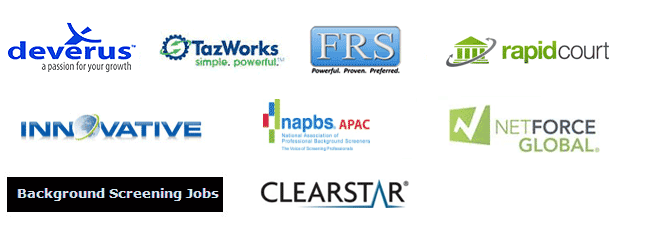

|  |
|
|
| |
|
Background
Screening Jobs |
|
Visit
the Job Board for the Employment and Tenant Screening Industry.
Here you will find resumes of people with industry experience
and employers seeking applicants with experience in Employment
and Tenant Screening and related businesses.
www.backgroundscreeningjobs.com


|
UPCOMING CONFERENCES, COURSES & EVENTS |
Feature
Education:
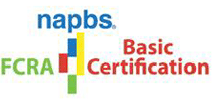 |
FCRA
Basic Certification Webinar Series Update
The
FCRA Basic Certification program series is now available
for purchase.
For
more information |
2013 Events ( Click
Here to View full list of Events ) - Updated
Monthly
SHRM
State Conferences, visit
http://www.shrm.org/Conferences/StateAffilliateConferences/Pages/default.aspx
Drug
and Alcohol Testing Industry Association (DATIA), 2013 Training
Course Schedule, visit
http://datia.org
SAPAA
Training Institute Learning Events, http://www.sapaa.com/
CUPA-HR
Conferences: http://www.cupahr.org/
World
Federation of People Management Associations, Events,
http://www.wfpma.com/events/by-region#quicktabs-tab-view__events__page_3-4
|
 Iska warran?
Iska warran?











 Kevin Coy is a Partner in the Washington DC office of Arnall
Golden Gregory LLP. Kevin
Kevin Coy is a Partner in the Washington DC office of Arnall
Golden Gregory LLP. Kevin 
 She explained that
Corporate Research and Investigations LLC actually began in 1990
as a local private investigation company and Kiran indicated that
the CRI Group was established in 2001 when the company began being
approached by many organizations to examine occupational fraud
and embezzlement within companies. At that time, most companies
did not have active employee risk mitigation measures in place
to stop fraud or to prevent internal business related crime. Post
September 11, organizations began institutionalizing a system
of risk assessment to determine risk metrics when bringing on
new staff. In this climate, CRI Group went the extra mile to create
a comprehensive employee background screening service department
which in the years since has become a leading and preferred partner
for some of the biggest international companies in the world.
She explained that
Corporate Research and Investigations LLC actually began in 1990
as a local private investigation company and Kiran indicated that
the CRI Group was established in 2001 when the company began being
approached by many organizations to examine occupational fraud
and embezzlement within companies. At that time, most companies
did not have active employee risk mitigation measures in place
to stop fraud or to prevent internal business related crime. Post
September 11, organizations began institutionalizing a system
of risk assessment to determine risk metrics when bringing on
new staff. In this climate, CRI Group went the extra mile to create
a comprehensive employee background screening service department
which in the years since has become a leading and preferred partner
for some of the biggest international companies in the world.

 Don't
Let Employment Investigations in APAC be the Weakest Link
in Your Background Screening Services.
Don't
Let Employment Investigations in APAC be the Weakest Link
in Your Background Screening Services. 



